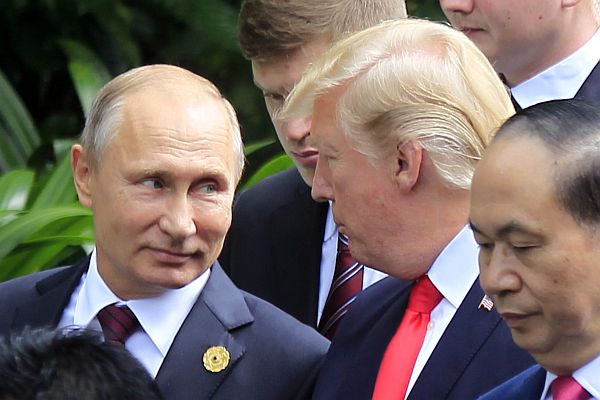Ministers from 11 Asia-Pacific countries agreed yesterday to press ahead with a major trade deal without the United States, as the world’s largest economy seeks to go it alone under President Donald Trump’s “America First” policy.
Trump pulled his country from the Trans Pacific Partnership (TPP) at the start of the year, dismaying allies and casting into doubt an agreement heralded for tying lower tariffs to strong environmental and labor protections.
He has been something of a lone protectionist voice at the Apec summit in the Vietnamese city of Danang where world leaders, including China’s Xi Jinping, have been keen to promote the virtues of free trade and multilateral deals.
In a joint statement yesterday morning, the remaining countries — dubbed the TPP-11 — said they had “agreed on the core elements” of a deal at the sidelines of the Apec summit in the Vietnamese city of Danang, after days of stalled talks raised fears it could collapse altogether.
The ministers said further talks would be needed to reach a full consensus before inking the deal, which now carries an even longer official name — the Comprehensive and Progressive Agreement for Trans-Pacific Partnership (CPTPP).
Japan’s lead negotiator Toshimitsu Motegi said the remaining members would still welcome the United States back into their pact.
“This time all the 11 countries are on board and this would send out a very strong positive message to the United States and other Asia Pacific countries in the region,” he said.
Francois-Philippe Champagne, Canada’s trade minister, described the breakthrough in a tweet as “big progress.”
Canada had held out to maintain environmental and labor protections linked to freer markets in the deal.
Those elements were thrown into jeopardy by America’s sudden withdrawal from the deal earlier this year.
Canada had dug in over those progressive clauses. But they are much less attractive to countries like Vietnam, Malaysia, Chile and Peru now that the carrot of access to the huge US market has been pulled.
Upended consensus
Trump’s election has upended years of American-led moves to open up global trade.
The US president is among leaders attending the Apec summit in Danang and on Friday he ladled out more of his trademark “America First” rhetoric.
In a strident address he said his country will “no longer tolerate” unfair trade, closed markets and intellectual property theft.
“We are not going to let the United States be taken advantage of any more,” he added, taking a swipe at multilateral trade deals.
Shortly after, China’s Xi offered a starkly different vision, casting his country as the new global leader for free trade.
Beijing is not included in the TPP, a deal initially driven through by the former US administration as a counterweight to surging Chinese power in Asia.
